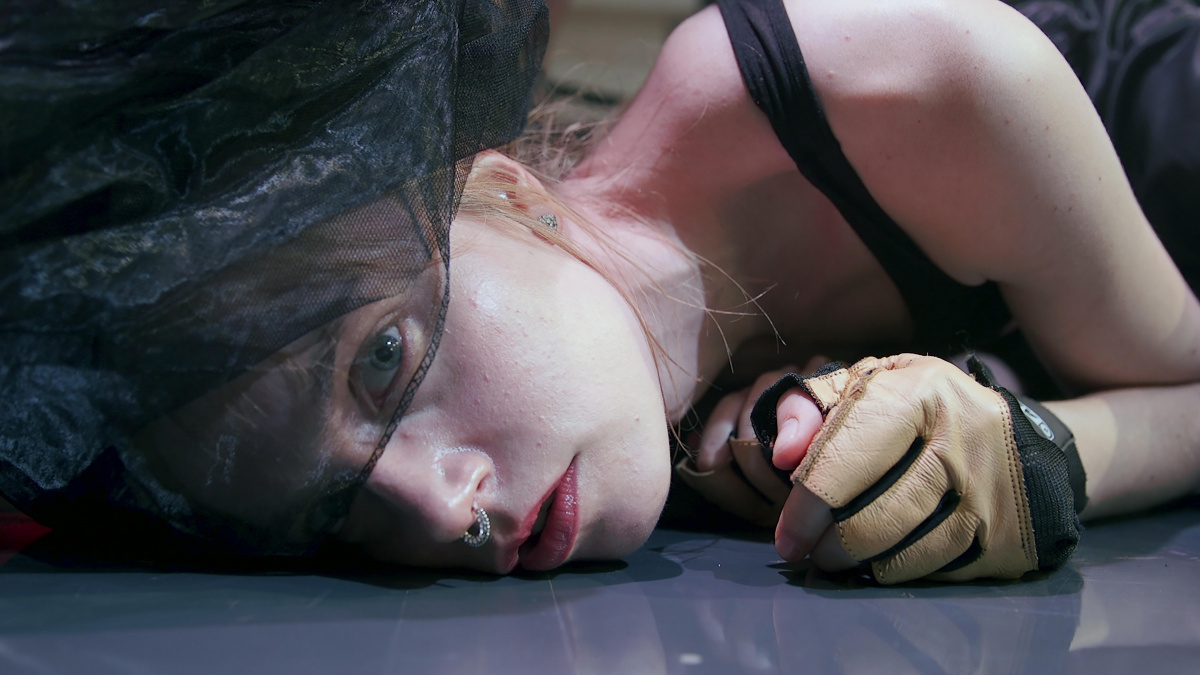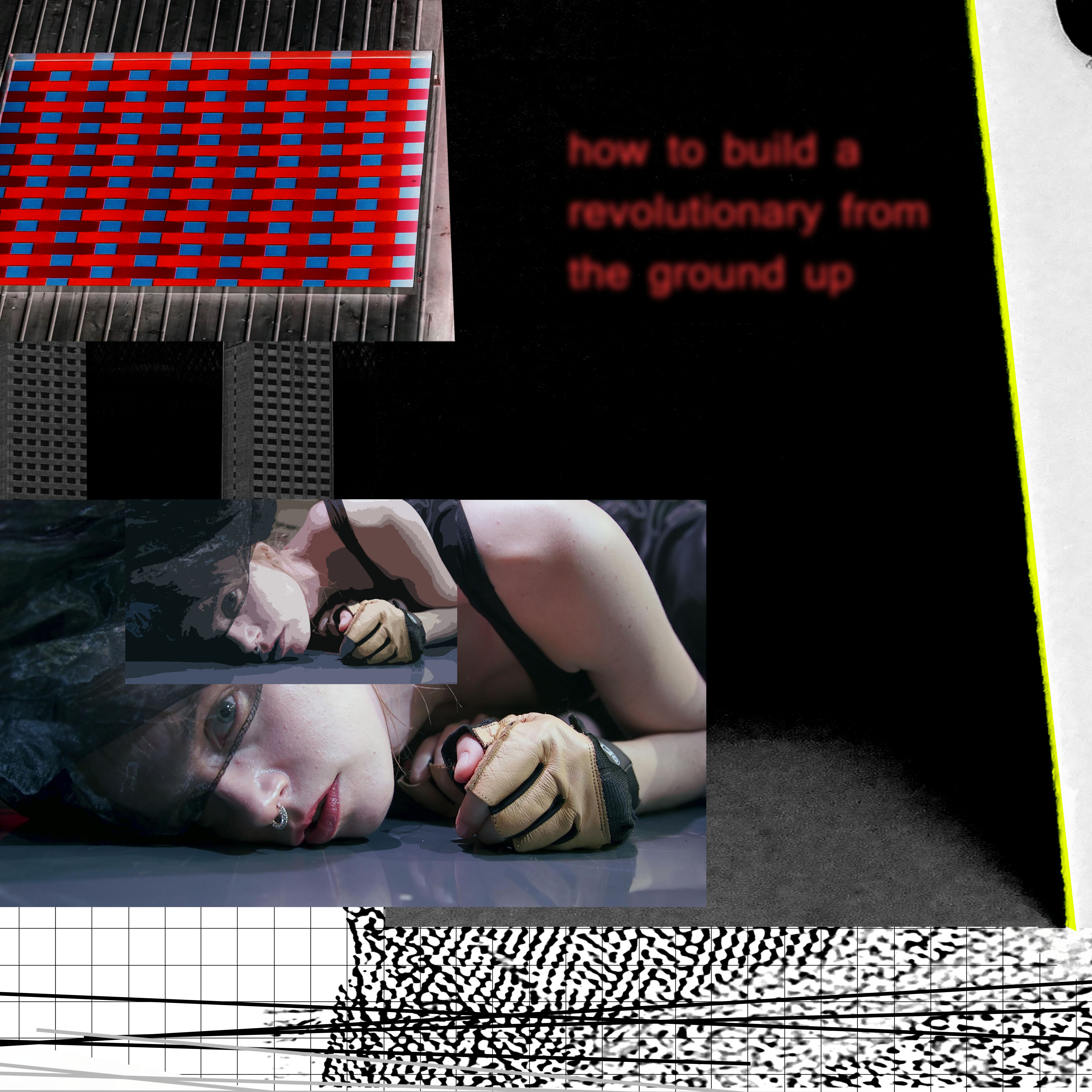
Static Resistance
Taking their name from a word meaning an ill-behaved, immature young woman, Polish band SIKSA and their frontwoman Alex Freiheit intrigue RRRKRTA with their dissociative approach to revolution. No wonder they are the subject of a performative dream of a film co-directed with Piotr Macha.
→ Check all articles of this special
→ Download PDF with introduction and table of contents
Just how static can resistance become? This was a question I asked myself in 2017 upon witnessing SIKSA’s breakout performance in Katowice, Poland. For a brief moment, Alex Freiheit, the frontwoman, seemed like the only person having fun. No drums, no rhymes, not even the bass player keeping the rhythm. There she was, running in the crowd, seemingly uncoordinated, yet patiently observant. So that when the time came, she could suddenly drop the most personal stories of abuse and inner conflict on the unsuspecting audience. It became clear that her modus operandi is to STOP things from happening for a while – not at all a typical punk experience.
Building a Revolutionary from the Ground Up
SIKSA’s gigs, as well as their film with director Piotr Macha, Stabat Mater Dolorosa, disguise Freiheit’s dissociative approach with calculated profanity aimed at sexual predators, parents, church, and state. This is not really why so many people feel offended by their performances, though. Freiheit might be a self-described bayonet, «stabbing that which is contemporary», but she’s actually quite stoic, even at times cynical, letting silence and unmodulated noise play its part. Which is why, between the lines, we’re invited to watch this movie not as an all-out attack on oppression but as proof of how intimate (and, at times, ridiculous) protest can get. It’s a musical, not a shock-rock music video.

The movie’s story is actually an accessible guide to building a revolutionary from the ground up. Childhood memories of socially accepted violence, teenage angst channeled through wordplay, and stunted family conversations, all show how easy it is to be deeply disgusted with patriarchy and its everyday manifestations. Freiheit’s dispassionate tone reminds us that the pretentious, mannered, and hence thin and predictable chauvinism that still prevails in Polish society is vulnerable, and can be exposed or even destroyed when it’s simply exposed to the light – and that emotional attachment may be the only thing protecting it. Of course, a healthy dose of controversy is included, like when Freiheit fakes pleas for a certain right-wing MP to come back home after years of abuse. Or when the images of a fashion show organized by famed Polish designer Tomasz Armada are interwoven with Freiheit renouncing feminism.
Dissociate, Drift Away
Her secret power, however, is not brute force but an ability to join compassion and sensitivity with asynchronicity and dissonance. I felt it during the group’s unannounced performance halfway through a techno night I was involved in. By means of performative fury, coated with unexpected grace and an understanding of the hecklers, Freiheit was able to effectively conquer the audience’s hearts. SIKSA plays with the Polish word siksa – meaning an ill-behaved, immature young woman – and the group lets the party stop and fume, creating a sense of stillness to reroute the narrative.
The same happens in Stabat Mater Dolorosa when Freiheit tells the story of her Turkish friend, Alper Sapan, who was killed in an attack in Kobane, Syria. Against the backdrop of boxers representing countries governed by authoritarian rulers, Freiheit claims that she’s happy he didn’t come to visit her since he would have been attacked by her hateful compatriots, and it was perhaps better that he died. It’s only then that we hear a scream that’s not faked. All the distractions she presents turn out to be emotionally productive, even if the only person to witness this is a guy dressed up as a banana. Against all the things thrown in your face, it’s wise to let SIKSA knock you off your rhythm. Dissociate, drift away. Then let them pull you back in.
The film «SIKSA: Stabat Mater Dolorosa» by Piotr Macha was officially selected at the Norient Film Festival NFF 2021. See full program here.
This text is part of Norient’s essay publication «Nothing Sounds the Way It Looks», published in 2021 as part of the Norient Film Festival 2021.
Bibliographic Record: Rhensius, Philipp. 2021. «Editorial: NFF 2021 Essay Collection.» In Nothing Sounds the Way It Looks, edited by Philipp Rhensius and Lisa Blanning (NFF Essay Collection 2021). Bern: Norient. (Link).
Biography
Published on January 17, 2021
Last updated on April 09, 2024
Topic
About Tunisian rappers risking their life to criticize politics and musicians affirming 21st century misery in order to push it into its dissolution.
Snap


